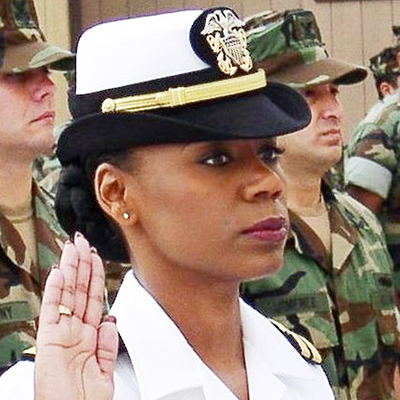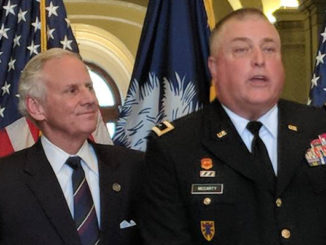
Most people know literally nothing about how the military dispenses justice. In fact, most members currently on active duty have no damn clue about the military’s so-called due process. It’s only when they get into trouble, do they begin to educate themselves. By that time it’s too late.
Let’s do a little review, before talking about the Navy’s “vessel exception” in the Uniform Code of Military Justice (UCMJ).
There are FIVE discharges U.S. military members can receive. Going from good to bad, the discharges are…
- HONORABLE,
- GENERAL UNDER HONORABLE CONDITIONS,
- OTHER THAN HONORABLE (OTH) (formerly known as an “Undesirable Discharge”),
- BAD CONDUCT DISCHARGE (AKA: The Big Chicken Dinner),
- And, the coup de grâce, the DISHONORABLE DISCHARGE.
The first three above discharges are done administratively, the last two are punitive and can only be handed down from a court martial. A summary court martial usually metes out the Bad Conduct Discharges for enlisted personnel, while a general court martial hands out a Dishonorable Discharge (DD) for both officer and enlisted. The DD is considered second only to death in severity.
When the military is confronted with “Mr. Clean,” someone who has violated no law, but they still want to rid themselves of the individual, they simply convene a board of officers, award an OTH, then escort him and his family to the gate. (REF: Army Major Andrew Higgins at the 25 Infantry Division in Hawaii).
The administrative OTH discharge is routinely reserved for those pesky whistleblowers who might tend to expose criminal misconduct by a flag-ranking officer. The entire system is rigged to protect the system. The military has a cute little phrase for it called, maintaining good order and discipline.
HISTORY
In the late 1940’s after WWII, Congress realized there was a problem in the military. A violation that would get you a sentence of peeling potatoes in the Army, that same violation would net you a long prison sentence from the Navy. The military (especially the Navy) is very big on punishing the shit out of people, except those at the rank of O-6 or above.
In 1950, Congress enacted their infamous Uniform Code of Military Justice (UCMJ). The problem was, the code was anything but uniform. When it became law, the Navy carved themselves out a little exception where due process could be denied. Due process, the Navy doesn’t need any stinking due process.
When the UCMJ was amended in 1962, military members in all other branches except the Navy, were given the due process right of turning down non-judicial punishment, requesting a trial by court martial instead. It’s always a bad move to do that because the court martial system is terribly flawed as well, which would result in someone going to prison for many years.
This special little exception for the Navy was called the, “Vessel Exception” and was only designed to apply to military member aboard ship. But, as the Navy sometimes does, they manipulated the intent of the law to fit their own evil purposes. If you were on shore duty, but coming up to transfer to a sea command within the next two years, the sly bastards in the Navy JAG corps would weave their little web waiting for you to transfer to your new sea command.
Once you arrived at your new sea command, you would immediately be arrested and thrown in the brig. And, and because some of your due process rights are thrown overboard when you are assigned to ship, the Navy can toss your who career in the toilet …. and hell, you could very well be innocent of the charges, but no one cares.
NAVY’S VESSEL EXCEPTION
Only a few days ago, the Military Times had a good article on the Navy’s Vessel Exception, and we encourage our readers to give it a quick read. The ARTICLE is by Mr. David Johnson, a graduate of Regent Law School, former JAG officer, paratrooper and combat veteran. He’s credited with saving the careers of many military members the military was attempting to railroad right into prison.
He said the reality is that most commanding officers have made up their mind about someone’s guilt or innocence before even convening an Article 15 hearing, AKA: Captain’s Mast. He fails to mention that most jurors in a court martial have already made up their mind about guilt or innocence because the convening authority is writing their OER’s or Fitness Reports.
The Navy’s Vessel Exception is just another example of how the system is rigged against military members. It’s just another reason not to even consider service to America in the military. We say this with a heavy heart.
One of our own staff members here at MilitaryCorruption.com was denied access to a lawyer three times while he was in the naval reserves and not attached to any ship. The Navy even brazenly admitted in a naval message that he had established an attorney client relationship, but, screw due process, they just made up the rules as they went along.
It’s obvious that David Johnson the author of the Military Times article has some faith the system can work, but he also realized the hard truth that nearly 100% of all sailors and Marines appearing at Captain’s Mast (Art. 15 hearing) will be found guilty.
We at MilitaryCorruption.com know better. The system is rife with corruption and needs to be completely overhauled with checks and balances so that innocent men and women are not sent to prison for 5, 10, 15 years.
And, their needs to be military reform to stop allowing flag-ranking officers from retiring to avoid accountability, which happens on a regular basis. Until there is real military reform, we will be fighting for truth and exposing the corrupt.
We are eagerly awaiting the arrival of Captain Wiseman Gould to help us in this fight for truth and justice, which are unfortunately not the American way.



